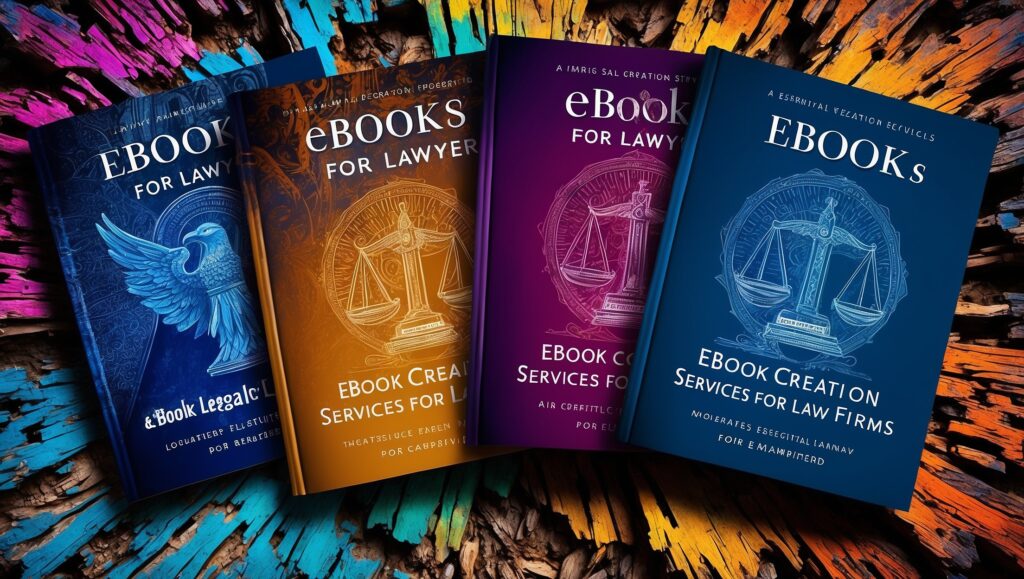E-Books for Lawyers 2024
Law firms are constantly seeking effective lead generation strategies to expand their client base and increase revenue. In today’s digital age, one powerful tool that can help achieve these goals is the use of eBooks. These digital resources not only provide valuable information to potential clients but also serve as a means to capture crucial data on leads. Understanding how eBooks can benefit your law firm’s lead generation efforts is essential to staying competitive in the legal industry. In this post we talk about how to best use Ebooks in your legal practice and as lead magnets to attract potential new clients. We provide all E-Book related services for lawyers including creating a top notch E-Book, creating ebook illustrations and artwork and promoting your legal ebook. We also have a variety of FREE E-Books for Lawyers related to SEO, AI, Video and other digital marketing services for lawyers. Download for free in an easy to read PDF format. E-Book Services for Law Firms Creation of Law Related E-books Using Legal E-Books as Lead Magnets Translation of e-books to other languages. Creation of custom AUDIO Books FREE E-Book for Lawyers QUOTE ** Download Free E-Books for Lawyers SEO For Lawyers E-Book AI For Lawyers E-Book E-Books for Lawyers – Legal Lead Magnets Key Takeaways: eBooks are a valuable tool for law firms to generate leads and establish thought leadership. Successful law firm eBooks incorporate key elements such as an interesting title, engaging visuals, and a strong call-to-action. Choosing the right topic for your eBook involves considering your target audience and their challenges. Drafting and distributing your eBook requires careful planning and promotion through various channels. The benefits of eBooks for law firm lead generation include increased visibility, higher engagement, and measurable results. Elements of a Successful Law Firm eBook Creating a successful law firm eBook involves incorporating various key elements that enhance its value and effectiveness in lead generation. By paying attention to these essential components, you can develop a compelling eBook that resonates with your target audience and drives leads for your law firm. Title and Visuals: A descriptive and interesting title is crucial for attracting readers and generating interest in your eBook. It should accurately convey the content and benefits of the eBook. Additionally, investing in visually appealing cover designs can capture attention and make your eBook more enticing. Organization and Structure: Ensure your eBook is well-organized and easy to navigate. Including a tagged system for categorizing content allows readers to easily find information they’re interested in. A table of contents and new chapter pages make it convenient for readers to jump to specific sections or chapters. Engaging Content and Visual Breaks: Compelling and informative content is essential for keeping readers engaged throughout your eBook. Incorporate visuals, such as images, graphs, and infographics, to break up the text and make it more visually appealing. This helps in maintaining readers’ interest and enhances overall readability. Interactive Elements and Call-to-Action: Encourage reader engagement by incorporating interactive elements such as social sharing components, where readers can easily share snippets or the entire eBook on their social media platforms. Additionally, include clear call-to-action buttons or links at the end of the eBook to prompt readers to take the desired action, such as booking a consultation or subscribing to your newsletter. Accessibility and Compatibility: Make sure your eBook is accessible across multiple devices, including mobile phones and tablets. This allows readers to conveniently access and read your eBook on their preferred devices, increasing the chances of engagement and lead generation. Service Call-Outs: Incorporate subtle call-outs throughout your eBook that highlight the services or expertise your law firm offers. This serves as a gentle reminder to readers about the value and benefits they can gain by engaging with your firm. Table: Element Description Title and Visuals A descriptive and captivating eBook title along with visually appealing cover designs. Organization and Structure A tagged system, table of contents, and new chapter pages for easy navigation. Engaging Content and Visual Breaks Compelling content supported by visuals like images, graphs, and infographics. Interactive Elements and Call-to-Action Social sharing components and clear call-to-action buttons or links. Accessibility and Compatibility Ensure the eBook is accessible on various devices, including mobile. Service Call-Outs Subtle reminders of the services or expertise your law firm offers. By incorporating these elements into your law firm eBook, you can create a powerful lead generation tool that showcases your expertise, captures readers’ attention, and drives engagement with your firm. Choosing the Right Topic for Your eBook Choosing the right topic for your eBook is crucial for its success. By selecting a topic that resonates with your target audience and addresses their challenges, you can capture their attention and establish yourself as an authority in your field. To start, consider your target audience. What are their pain points? What information or solutions do they seek? By understanding their needs, you can create an eBook that provides valuable insights and solutions. Another tip is to choose a niche topic. Instead of covering broad subjects that may already have plenty of content available, focus on a specific aspect or angle that hasn’t been extensively explored. This allows you to offer fresh perspectives and unique insights, making your eBook more appealing to your audience. Additionally, repurposing existing blog material can be a great way to create an eBook. Look for your most popular or highest-performing blog posts and expand on them, providing more in-depth information and additional resources. This not only saves time but also ensures that your eBook is based on content that has already been well-received by your audience. Table: Choosing the Right Topic for Your eBook Considerations Tips Target Audience Identify their pain points and informational needs Niche Topics Choose a specific aspect that hasn’t been extensively explored Repurposing Content Expand on popular blog posts to provide more value By following these tips, you can choose a topic that resonates with your target audience, positions your law firm as an industry expert, and drives lead generation
E-Books for Lawyers 2024 Read More »







